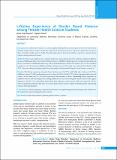Please use this identifier to cite or link to this item:
https://hdl.handle.net/20.500.14356/897Full metadata record
| DC Field | Value | Language |
|---|---|---|
| dc.contributor.author | Bhandari, Mukta Singh | - |
| dc.contributor.author | Chataut, Jagdish | - |
| dc.date.accessioned | 2023-04-04T06:29:47Z | - |
| dc.date.available | 2023-04-04T06:29:47Z | - |
| dc.date.issued | 2022 | - |
| dc.identifier.citation | Singh BhandariM., & ChatautJ. (2022). Lifetime Experience of Gender Based Violence among Female Health Science Students. Journal of Nepal Health Research Council, 20(02), 399-404. https://doi.org/10.33314/jnhrc.v20i02.4020 | en_US |
| dc.identifier.issn | Print ISSN: 1727-5482; Online ISSN: 1999-6217 | - |
| dc.identifier.uri | http://103.69.126.140:8080/handle/20.500.14356/897 | - |
| dc.description | Original Article | en_US |
| dc.description.abstract | Abstract Background: Gender based violence is a common public health problem across all parts of the world with women and girls being common victims. Despite the equal risk of unmarried women to experience gender based violence, there is dearth of studies done in Nepal. Thus, this study aims to find out the lifetime experience of gender based violence among unmarried women. Methods: This was an analytical cross-sectional study done among female university students, studying at different streams of Kathmandu University School of Medical Sciences, Dhulikhel. Ethical approval was taken from Institutional Review Committee of Kathmandu University School of Medical Sciences (Reference number: 04/21). The calculated sample size was 120 and non-probability sampling technique was used. The study was conducted from March to May 2021. Data was collected by using Google Forms and analyzed in Statistical Package for Social Sciences version 16. Results: The lifetime experience of gender based violence was 154 (92%) with Public place violence 140 (91%), childhood violence 92 (60%) and intimate partner violence 67 (44%). Total 45 (27%) of the respondents had witnessed violence in the family and 24 (14%) had experienced discrimination at home. Relationship status, experience of childhood violence and witnessing violence during childhood were associated with gender based violence in the logistic regression. Total 79 (51%) respondents shared about their experience with someone while none reported. Total 41 (28%) respondents mentioned that they never faced gender based violence despite mentioning about experiencing violence in the questionnaire. Conclusions: Lifetime experience of gender based violence was high among unmarried young women with most of the respondents experiencing public place violence. Keywords: Gender based violence; intimate partner violence; violence | en_US |
| dc.language.iso | en | en_US |
| dc.publisher | Nepal Health Research Council | en_US |
| dc.relation.ispartofseries | April-June, 2022;4020 | - |
| dc.subject | Gender based violence | en_US |
| dc.subject | Intimate partner violence | en_US |
| dc.subject | Violence | en_US |
| dc.title | Lifetime Experience of Gender Based Violence among Female Health Science Students | en_US |
| dc.type | Journal Article | en_US |
| Appears in Collections: | Vol 20 No 02 Issue 55 April-June, 2022 | |
Files in This Item:
| File | Description | Size | Format | |
|---|---|---|---|---|
| 4020-Manuscript-29686-1-10-20221103.pdf | Full Article. | 211.95 kB | Adobe PDF |  View/Open |
Items in DSpace are protected by copyright, with all rights reserved, unless otherwise indicated.
